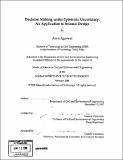Decision making under epistemic uncertainty : an application to seismic design
Author(s)
Agarwal, Anna
DownloadFull printable version (7.490Mb)
Other Contributors
Massachusetts Institute of Technology. Dept. of Civil and Environmental Engineering.
Advisor
Daniele Veneziano.
Terms of use
Metadata
Show full item recordAbstract
The problem of accounting for epistemic uncertainty in risk management decisions is conceptually straightforward, but is riddled with practical difficulties. Simple approximations are often used whereby future variations in epistemic uncertainty are ignored or worst-case scenarios are postulated. These strategies tend to produce sub-optimal decisions. We develop a framework based on Bayesian decision theory that accounts for the random temporal evolution of the epistemic uncertainty and minimum safety standards, and illustrate the effects of these factors for the case of optimal seismic design of buildings. Results show that when temporal fluctuations in the epistemic uncertainty and regulatory safety constraints are included, the optimal level of seismic protection exceeds the normative level at the time of construction. We do a sensitivity analysis concerning the repair and retrofit strategies that control the repair actions following earthquake damages and the amount of structural upgrading in the case of non-compliance with the safety standards. We see, that just like the optimal initial design system, upgrades should also be made conservatively to provide a margin of safety against future adverse changes in the epistemic uncertainty and regulations. The optimal degree of conservatism depends in a complex way on the cost of providing additional seismic protection, increase in earnings from additional seismic protection, costs of repairs and upgrading, seismicity of the region and the volatility of both the estimated hazard (due to changes in epistemic uncertainty) and the regulatory environment. The effect of all these influencing factors is studied through an extreme sensitivity analysis. We argue that the optimal Bayesian decisions do not depend on the aleatory or epistemic nature of the uncertainties, but only on the total (epistemic plus aleatory) uncertainty and how that total uncertainty varies randomly during the lifetime of the project.
Description
Thesis (S.M.)--Massachusetts Institute of Technology, Dept. of Civil and Environmental Engineering, 2008. Includes bibliographical references (leaves 90-92).
Date issued
2008Department
Massachusetts Institute of Technology. Department of Civil and Environmental EngineeringPublisher
Massachusetts Institute of Technology
Keywords
Civil and Environmental Engineering.